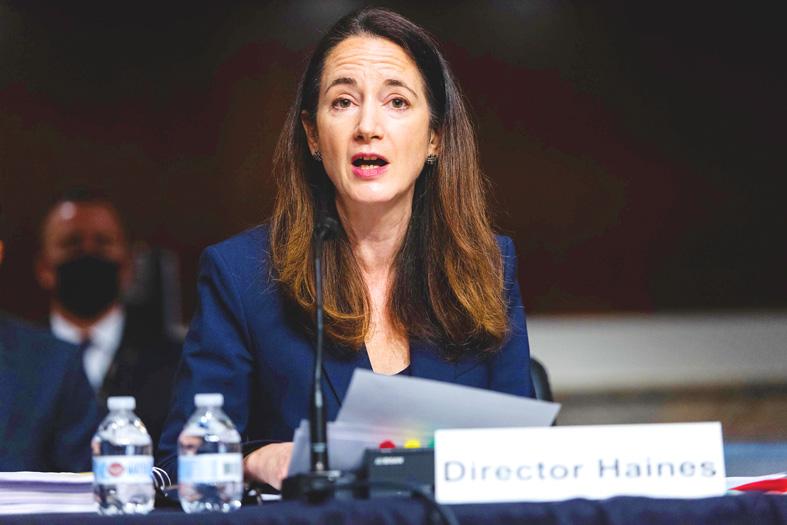Views in Taiwan are “hardening” in favor of independence after China’s moves in the past few years to tighten control over Hong Kong, the head of the US intelligence community said on Thursday.
“I would say that already Taiwan is hardening, to some extent, toward independence as they’re watching, essentially, what happened in Hong Kong, and I think that is an increasing challenge,” US Director of National Intelligence Avril Haines said in testimony before the US Senate Armed Services Committee.
Questions about China dominated the “Worldwide Threats” hearing with Haines and US Lieutenant General Scott Berrier, the head of the Defense Intelligence Agency.

Photo: Bloomberg
US-China ties have remained tense into US President Joe Biden’s administration, which has continued to criticize Beijing’s actions in Hong Kong, Xinjiang and the South China Sea. Haines previously called China an “unparalleled priority” for the intelligence community.
The spy chief was pressed by US Senator Jack Reed, the panel’s chairman, on the impact that a shift clarifying the US’ long-held position of “strategic ambiguity” on defending Taiwan if it is attacked would have in Beijing and Taipei. Such a move would involve the US saying definitively that it would come to Taiwan’s aid in the case of an attack.
China “would find this deeply” destabilizing, and it would “solidify Chinese perceptions that the US is bent on constraining China’s rise, including through military force,” Haines said.
Berrier said he sees a “significant” threat from China’s rapid modernization of its military, saying that the Chinese People’s Liberation Army is capable of placing nuclear warheads on its next-generation hypersonic missiles.
China is increasingly using technology to try to “gain near-real-time tracking and observation” of Pentagon personnel and activities, he added.
Chinese Ministry of Foreign Affairs spokesman Wang Wenbin (汪文斌) yesterday told a regular briefing that Beijing is determined to uphold its “sovereignty and territorial integrity.”
“The US should sufficiently recognize the harmful and dangerous nature of Taiwan independence,” he said.
A record 32 percent of Taiwan’s public favors immediate or eventual independence, according to a poll in December last year by the Election Study Center at National Chengchi University.
That figure comes as Beijing tightens its political grip over Hong Kong, in part by imposing national security legislation on the territory.
Still, 54 percent of the survey respondents expressed a preference for maintaining the “status quo” in the Taiwan Strait.

MAKING WAVES: China’s maritime militia could become a nontraditional threat in war, clogging up shipping lanes to prevent US or Japanese intervention, a report said About 1,900 Chinese ships flying flags of convenience and fishing vessels that participated in China’s military exercises around Taiwan last month and in January last year have been listed for monitoring, Coast Guard Administration (CGA) Deputy Director-General Hsieh Ching-chin (謝慶欽) said yesterday. Following amendments to the Commercial Port Act (商港法) and the Law of Ships (船舶法) last month, the CGA can designate possible berthing areas or deny ports of call for vessels suspected of loitering around areas where undersea cables can be accessed, Oceans Affairs Council Minister Kuan Bi-ling (管碧玲) said. The list of suspected ships, originally 300, had risen to about

DAREDEVIL: Honnold said it had always been a dream of his to climb Taipei 101, while a Netflix producer said the skyscraper was ‘a real icon of this country’ US climber Alex Honnold yesterday took on Taiwan’s tallest building, becoming the first person to scale Taipei 101 without a rope, harness or safety net. Hundreds of spectators gathered at the base of the 101-story skyscraper to watch Honnold, 40, embark on his daredevil feat, which was also broadcast live on Netflix. Dressed in a red T-shirt and yellow custom-made climbing shoes, Honnold swiftly moved up the southeast face of the glass and steel building. At one point, he stepped onto a platform midway up to wave down at fans and onlookers who were taking photos. People watching from inside

Japan’s strategic alliance with the US would collapse if Tokyo were to turn away from a conflict in Taiwan, Japanese Prime Minister Sanae Takaichi said yesterday, but distanced herself from previous comments that suggested a possible military response in such an event. Takaichi expressed her latest views on a nationally broadcast TV program late on Monday, where an opposition party leader criticized her for igniting tensions with China with the earlier remarks. Ties between Japan and China have sunk to the worst level in years after Takaichi said in November that a hypothetical Chinese attack on Taiwan could bring about a Japanese

The WHO ignored early COVID-19 warnings from Taiwan, US Deputy Secretary of Health and Human Services Jim O’Neill said on Friday, as part of justification for Washington withdrawing from the global health body. US Secretary of State Marco Rubio on Thursday said that the US was pulling out of the UN agency, as it failed to fulfill its responsibilities during the COVID-19 pandemic. The WHO “ignored early COVID warnings from Taiwan in 2019 by pretending Taiwan did not exist, O’Neill wrote on X on Friday, Taiwan time. “It ignored rigorous science and promoted lockdowns.” The US will “continue international coordination on infectious